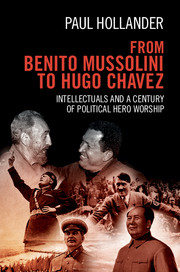Book contents
- Frontmatter
- Contents
- Preface
- 1 Introduction: Intellectuals and Politics
- 2 Mussolini, Fascism, and Intellectuals
- 3 Hitler, Nazism, and Intellectuals
- 4 Stalin, Rakosi, Soviet Communism, and Intellectuals
- 5 Western Intellectuals, Mao's China, and Cambodia under Pol Pot
- 6 Castro, Che Guevara, and Their Western Admirers
- 7 Other Dictators and Their Admirers in More Recent Times
- 8 Conclusions: The Personal and the Political
- Index
5 - Western Intellectuals, Mao's China, and Cambodia under Pol Pot
Published online by Cambridge University Press: 19 January 2017
- Frontmatter
- Contents
- Preface
- 1 Introduction: Intellectuals and Politics
- 2 Mussolini, Fascism, and Intellectuals
- 3 Hitler, Nazism, and Intellectuals
- 4 Stalin, Rakosi, Soviet Communism, and Intellectuals
- 5 Western Intellectuals, Mao's China, and Cambodia under Pol Pot
- 6 Castro, Che Guevara, and Their Western Admirers
- 7 Other Dictators and Their Admirers in More Recent Times
- 8 Conclusions: The Personal and the Political
- Index
Summary
The people seem happy and well fed … the change in the countryside is miraculous … The stress and even violence of 1966–69 have now been succeeded … by a sense of relaxation and euphoria that makes 1972 a happy time to be in China … The Maoist revolution is on the whole the best thing that happened to the Chinese people in centuries.
John K. Fairbank[Here is] a people marching with light step and with fervor toward the future. This people may be the incarnation of the new civilization of the world. China has made an unprecedented leap into history … Mao is essentially antidogmatic and antiauthoritarian. He prizes the initiative of the masses.
Maria Macciocchi[Mao] seldom seemed moved by the suffering of lovers, children, and friends any more than he flinched from imposing misery on millions of faceless “masses” in pursuit of his economic and political schemes … he ignored realities that contradicted his vision … Mao was devoid of human feeling, incapable of love, friendship or warmth … he had become inured to human suffering … Morality had no place in Mao's politics.
Li ZhisuiOnce more it has to be emphasized that it is difficult to separate the favorable attitudes toward the leaders here examined from similar attitudes toward the political system they represented. The admiration of the supreme leaders was an integral part of the wholehearted endorsement of the political-social system they created and presided over. It was the leaders who were credited with, and praised for, all the perceived accomplishments of the systems concerned. But readers also need to be reminded that, for the most part, the sanguine assessments of China under Mao belong to the past, as reflected in the conclusion reached by the University of Hong Kong historian, Frank Dikotter: “in China the story of liberation and the revolution that followed is not one of peace, liberty and justice. It is first and foremost a history of calculated terror and systematic violence.”
- Type
- Chapter
- Information
- From Benito Mussolini to Hugo ChavezIntellectuals and a Century of Political Hero Worship, pp. 162 - 203Publisher: Cambridge University PressPrint publication year: 2017



